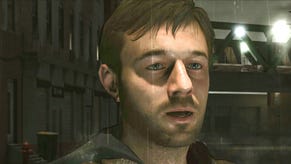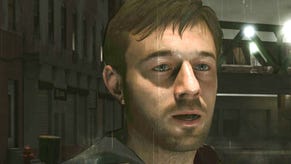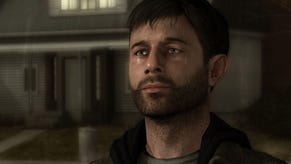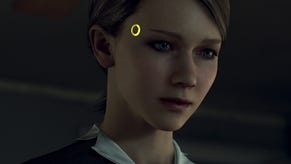Heavy Rain
Pored over.
Away from these occasional sharp reactions, there's the ongoing theme of having to ask difficult questions of people in the throes of grief, and it's practically impossible not to identify and emphathise with Scott Shelby as he attempts to push, but not too hard. Within the first few hours, Shelby comes across as the most idealised character, within a broad spectrum of otherwise-dysfunctional or down-on-their-luck individuals, all of whom are, however, portrayed very realistically.
The key to this, of course, is the game's exceptional character detail. The load screens are extreme close-ups of the next playable character's face, as if to encourage you to seek out blemishes through a magnifying glass. From the bags under Shelby's eyes to the fine stubble on Ethan's chin and the cut on Jayden's cheek, you can't. There is also sufficient stylisation in the way each character is defined to evade the infamous Uncanny Valley, and the artists' subtle and astute observation - which owes a lot to the game's extensive performance capture - also pervades the animation. Watching Ethan Mars put on a shirt is like watching a bloke put on a shirt. We're there.
It only ever looks wrong if you perform an unnatural act. That may sound as though the game's controls and movements are restrictive, but in actual fact the bond between player and character is seldom forced, with the interface versatile and intuitive. It's impossible to dismiss Heavy Rain as a sequence of "quick-time events" once you begin to play it; the extraordinary visuals, intriguing activities and mature way the game interprets and anticipates your actions transcend the traditional relationship between, say, Lara Croft and the pendulum blade the X button is designed to propel her away from during the heat of an in-engine cut-scene.
Heavy Rain's novelties extend into its fiction too. We've been promised no yellow internet monsters this time, Fahrenheit fans, but writer David Cage is evidently still fascinated by the psychological impact of physical and emotional trauma, evinced by a trip to the doctors with Ethan Mars, who is experiencing potentially dangerous blackouts. Cage trusts and teases the player a little too - at one stage Shelby straightens up as though he's about to go into a similar catatonic state, but it quickly becomes apparent he's actually having a mild asthma attack.
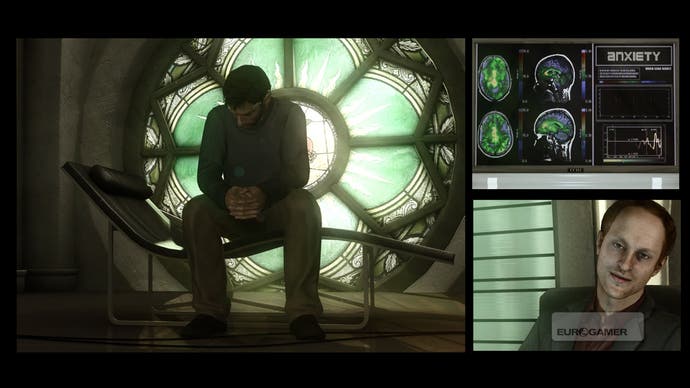
With the majority of the sequences I've played set in late 2011, there are a few futuristic touches too. Norman Jayden is equipped with a pair of computer-augmented spectacles called ARI, which along with a special glove attachment allow him to record what he sees, store audio notes, access information relevant to his surroundings via an overlay within his field of view, and manipulate virtual objects.
In one rather cute moment, he kills time at the police station by bouncing a virtual ball against a virtual wall. At a crime scene, he traces scents, footprints and DNA samples with ARI. When he is dumped in a dusty, barren old office, he ignores the pinboard, sweeps the phone and files off the desk and uses ARI to create a virtual office on top of a mountain or at the bottom of the sea. He then flicks through virtual files, drags and drops the locations that bodies were dumped onto a pull-down map, and considers his case notes as he tries to draw up a profile of the Origami Killer.
Elsewhere, there are more traditional and restrained methods of storytelling, including good use of static camera angles (of which a couple can usually be cycled), and the way key concepts and details are often introduced at the periphery. Nobody ever stands in front of you and spells out what is going on, and they needn't, either.
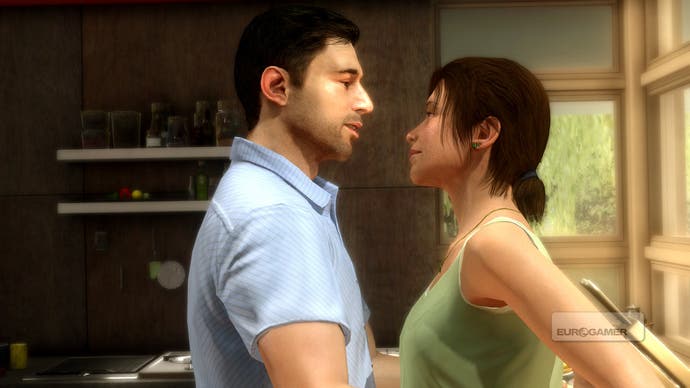
Throughout, Quantic Dream's composition is as accomplished as almost anything I've played. Uncharted 2 arguably bests Heavy Rain for convincing interplay between characters, but Heavy Rain hits back by keeping you in control, despite comparable visual fidelity. The only technical question mark remains over sections of the dialogue and voice acting, which sometimes comes across as a little unnatural - perhaps as an otherwise-imperious Cage struggles to disguise the fact he's writing in his second language. But it's a minor blemish, only discernible in the context of the superlative construction evident elsewhere.
With that said though, story isn't just a vital component of Heavy Rain, it is the absolute core, which makes it difficult to draw any serious conclusions even after playing a continuous portion of the game. Strands and themes are starting to coalesce over the horizon, and mysteries have dawned or shone through the ever-present clouds that descend beyond the shattering prologue. But the way everything works together across the course of the game will probably be what determines its quality.
At the moment, it's fascinating and compelling, despite the heavy, sometimes-cloying atmosphere and sense of sadness, despair and alienation. Heavy Rain is racing through virgin territory before you have even finished learning how to steer it, and whether or not it proves to be a great success, it already stands apart.
Heavy Rain is due out exclusively for PlayStation 3 in early 2010.


